

On Tuesday San Francisco voters approved by a 77 to 23 percent margin Proposition J, which will increase the city’s minimum wage from the current $10.74 per hour to $12.25 per hour by May 1, 2015. The city’s minimum wage would climb to $13 per hour by July 2016; to $14 per hour by July 2017 and $15 per hour by July 2018.
“Prop. J will provide a much needed raise to $15 per hour for 140,000 of the lowest paid workers in our city,” Gordon Mar, executive director of Jobs with Justice, San Francisco, told Capital & Main. “Prop. J will also raise the bar nationally for minimum wage policies.”
The “Fight for $15” to gain a higher minimum wage for workers began in Seattle, Washington. Voters there, with Socialist Alternative city council member Kshama Sawant spearheading a grassroots movement,
» Read more about: Big Bay Area Victories for Living Wages »
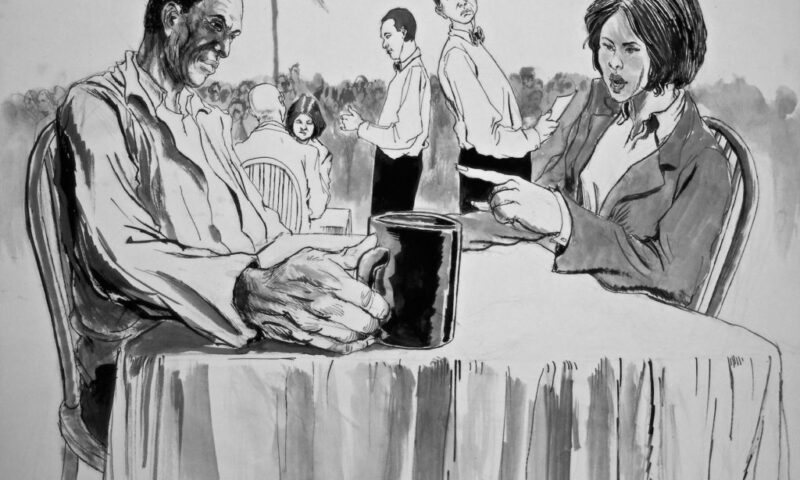

Juanita Evers and Hank Dixon walked into the Mercado La Paloma on Grand at a little past one in the afternoon. The main building had been a garment factory but was now turned into an open space of mom and pop shops. There was one featuring Oaxacan handmade curios, a sports gear seller and various ethnic-style eateries. The place had been developed by a nonprofit.
“How about over there?” Juanita said, pointing to a stall offering Thai food tucked back in a corner of the expanse.
“Okay by me,” Dixon replied. “I could stand some spicy chow.”
They ordered and sat at a nearby table. He said, “You really think the congresswoman can help us?”
“She’s very interested in what the university does and wants it to do right by her constituents.” Juanita was a field deputy for Congresswoman Karen Nelson, whose district included the Eden Arms where Dixon lived.
» Read more about: The Dixon Family Chronicles: “You Gonna Step Up?” »


Halloween is the time of year dedicated to scary stories, and in In the Public Interest report, “Out of Control,” there are 26 frightening and factual tales of how the push for government outsourcing is hurting taxpayers around the country.
You will be horrified by the real-life examples of Americans tricked by privatization, from a nun fighting cancer who was wrongly dumped from food stamps and Medicaid to foster children placed in severely abusive homes. Privatization is something to be feared when our elected officials aren’t carefully protecting the public’s interest.
We work every day to prevent future privatization horror stories from creeping and crawling their way into our democracy. Because just like Chicago, which leased its parking meters for 75 years to a Morgan Stanley-led private consortium, a bad privatization deal can haunt a community for generations.
Show off your Halloween spirit and share this terrifying report on twitter using the hashtag #PrivatizationHorror.
» Read more about: Privatization’s Trick-or-Trick Halloween »


The chefs over at Labor 411 have come up with a host of Halloween recipes from union-made ingredients. Treats include Mummy Dogs, No-Bake Marshmallow Witches, Rummy Worms, and our favorite, Graveyard Rice Krispies Treats. We’ve included the easy-to-follow recipe below.
And if you still haven’t purchased treats for tonight’s trick-or-treaters, check out Labor 411’s list of union-made candy!
Graveyard Rice Krispies Treats
Ingredients (purchase from your local unionized grocery store):
4 cups Kraft miniature marshmallows
¼ cup Land O Lakes butter, cubed
6 cups Kellogg’s Rice Krispies cereal
12 Oreos
1 tube white decorating gel frosting
1 can Betty Crocker chocolate frosting
Halloween sprinkles
Instructions:
1. In a large saucepan, combine and stir marshmallows and butter over medium-low heat until melted.


Today Christopher Klein, a U.S. bankruptcy judge, approved the city of Stockton’s plans to exit bankruptcy – ensuring that the pensions of Stockton’s retired public workers will not be subject to a tug of war among the city’s creditors.
“Judge Klein’s decision reinforces the confidence we had in our plan from the beginning,” Stockton City Councilmember Elbert Holman told Capital & Main by phone. Holman, along with Paul Canepa and Kathy Miller, voted to file for Chapter 9 bankruptcy; all three remain in office.
The judge’s Thursday decision had not been a foregone conclusion. On October 1, Klein had ruled that the federal bankruptcy code could trump the state’s retirement law that protects public employees’ defined-benefit pensions – and thus expose these retirement plans for “impairment,” or cuts. This prompted the Sacramento Bee’s political columnist, Dan Walters, to cite a Wall Street source’s favorable response: “Moody’s Investors Service underscored that effect by declaring that Klein’s ruling is ‘welcome news for investors’ in municipal debt.”
Stockton’s experience with bankruptcy – and the shadowy role of Wall Street credit-rating firms —
» Read more about: Judge Keeps Pensions Out of Stockton Bankruptcy Deals »


A 40-foot fall isn’t necessarily fatal for the average adult. But for California’s public employees whose jobs require them to routinely work on ladders or mechanical devices at heights more than 40 feet, it was deemed enough of a threat to life and limb to offer them a modest premium in their monthly pay packet.
In the case of firefighters, it also seemed sensible to kick in a little more for the tiller operators that control the 100-foot aerial ladders from which their brothers occasionally rescue a taxpayer from a burning building.
In fact, 99 such hazard premiums and professionalizing workforce incentives that have historically been considered pensionable compensation for public workers were deemed to be such no-brainers that they passed the scrutiny of the legislature and the governor when Jerry Brown signed into law 2012’s Public Employee Pension Reform Act (PEPRA). Today the average public pension in California is $2,945 per month.
» Read more about: Pension Envy: What the L.A. Times’ CalPERS Story Got Wrong »
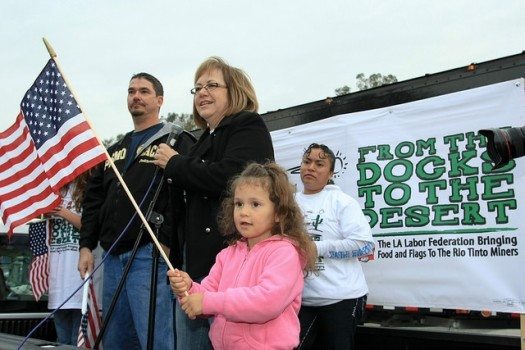

María Elena Durazo announced today that she will leave the LA County Federation of Labor, which she has led for more than eight years.
“I feel that the Los Angeles labor movement is very strong, very progressive, very proactive,” she told the Los Angeles Times. “Altogether, we have accomplished a lot. And there is a passion I have always had for immigration and civil rights. So I have the opportunity to do this and completely focus on those issues.”
Durazo will take a new post as international vice-president for immigration, civil rights and diversity at UNITE HERE, whose Los Angeles-based Local 11 she led before joining the County Fed.
A Los Angeles magazine profile last year called Durazo “the leader of what is perhaps the most robust labor movement in the country.” With her lead,
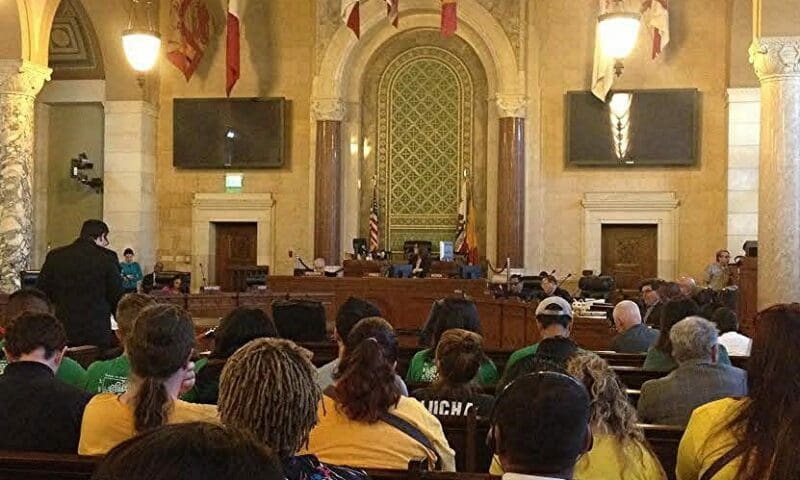

Los Angeles City Council members convened Tuesday for an Economic Development Committee hearing on a motion that would raise the minimum wage for workers in the City of Los Angeles to $13.25 per hour beginning in July 2017, and link future wage hikes to the Consumer Price Index. The motion also calls for an independent study on the economic impact of raising the minimum wage to $15.25 per hour after 2017. Councilmembers further discussed a closely related motion that would focus on the challenge of implementing and enforcing the new wage laws.
Supporters from a variety of local community and labor organizations, each wearing different colored T-shirts, showed up to back the wage increase, including from the Koreatown Immigrant Workers Alliance (KIWA), Alliance of Californians for Community Empowerment (ACCE), L.A. Black Workers Center and Restaurant Opportunities Center Los Angeles (ROC-LA), among others. The hearing, which came just a month after Council members voted to raise the minimum wage to $15.37 for certain hotel workers,
» Read more about: Citywide Wage Hike Gets First Council Hearing »


Night. In this version of the dream, the truck fishtails through the curtain of smoke and flame. Off to the right of her MRAP, the water tanker’s metal skin has split open, sending the liquid treasure everywhere. She watches in stutter shutter clicks as the vehicle’s driver fights to keep that bad boy under control, at the same time zig-zagging past the bombed, burning panel truck.
Corporal Jess Dixon is up top manning the M2 machine gun in the open turret. She swings the weapon about in tight arcs on greased ball bearings, sighting down, wishing for a target as she fires blind. The water tanker hits a slick of burning oil and, brakes screeching, flips, and tons of steel go into a slide. Over her headpiece, not the crackle of her CO, but Whitney Houston singing “It’s Not Right, But It’s Okay.” The armored vehicle clips the tanker, but that ain’t no thing,
» Read more about: The Dixon Family Chronicles: “Early in the Morning” »
With Los Angeles Mayor Eric Garcetti and six city council members proposing an increase in the minimum wage, the issue sits firmly on the front burner of L.A. government. Of course the Chamber of Commerce and its allies wring their hands and predict disaster, and some economists are throwing scary statistics back and forth.
Will raising the minimum wage to a livable income raise prices? Probably a bit in some parts of the economy. Will people lose their jobs? Probably a few in some sectors, for a short time. Will the economy grow as a result of poor people having more income to spend? Again, probably. Will life be better for low-wage working families? Undoubtedly.
Minimum wages should provide enough income for working families to put shelter over their heads, food on their tables and clothes on their backs. Employers should pay working people enough to not require government and taxpayers to supply the basic needs of a family.


Introducing for-profit companies into America’s criminal justice system has been a bad deal for governments across the country.
During the past several years, a movement opposed to profit incentives in our criminal justice system has grown. Private prison corporations such as Corrections Corporation of America and GEO Group have come under increasing scrutiny and pressure for cutting corners, contracts that include “occupancy guarantees” of 80, 90 and even 100 percent, and unsafe prison conditions.
But it’s not just the prisons that are handed over to CCA or GEO Group. Almost every service delivered inside the prison is being outsourced to for-profit corporations. Outsourced inmate health care, food and commissary services, telephone and financial services like money transfers between families and inmates are all adding to the poor conditions in prisons and burdening inmates and their families with extra costs.
For example, earlier this month, the Palm Beach Post broke the story of the deplorable treatment of prisoners by health care contractors in Florida prisons as contractors seek to maximize profits by cutting costs.
» Read more about: For-Profit Corporations’ Prison Break-in »
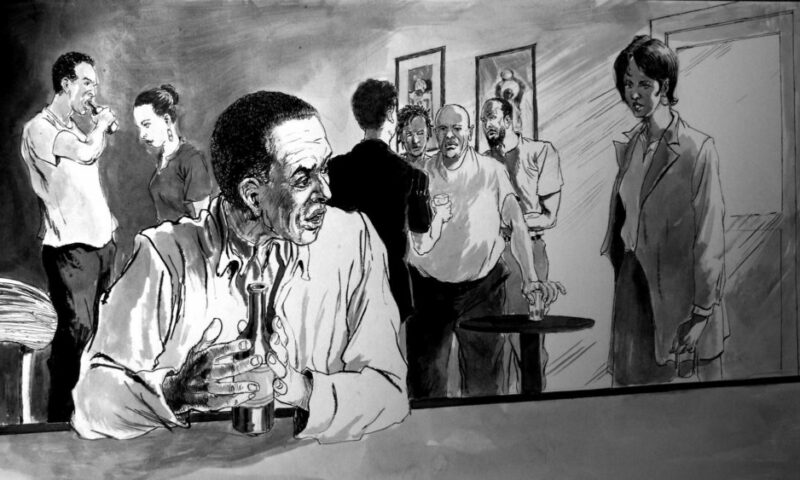

“Son of a . . . ”
Splitting a knuckle open, Jess Dixon grunted through gritted teeth. Working to get the rusted wheel nut loose, it had come undone too fast as she wrenched on the tire iron. Her hand banged onto the edge of the wheel well.
Ignoring the pain, she hurried and got done removing the slashed tire and put the spare on and secured it in place on the hub. The spare was not in good shape, worn smooth on one side, the steel belt underneath just about exposed. She didn’t dig her job but she couldn’t be losing it either.
She got her car going and drove to work, hoping she wouldn’t have a blowout on the lousy tire. Because she got up early each morning, and knew how to change a tire and a few other car repairs from her Uncle Hank showing her,
» Read more about: The Dixon Family Chronicles: “Time Is Tight” »


If you watched the Roosevelt series on PBS, as I did, you might have been struck by how Teddy and FDR saw their presidential duties. Both acted on the belief that the role of the federal government was to secure the material wellbeing of the American people. In their eyes the central government had a responsibility for full employment, living wage jobs and reining in the power of corporate America, among other initiatives. They took responsibility for how the national economy impacted the ordinary citizen and saw government action as a vehicle to reverse economic suffering.
Fast forward to the present. We now have a largely paralyzed federal government, consumed in debate over whether or not government action is a curse or a blessing, and unable or unwilling to address the widening income gap. In response, many major American cities are stepping into that pro-active, Roosevelt role; new minimum wage laws have been passed,
» Read more about: The Minimum Wage: A New Deal for Los Angeles Workers? »
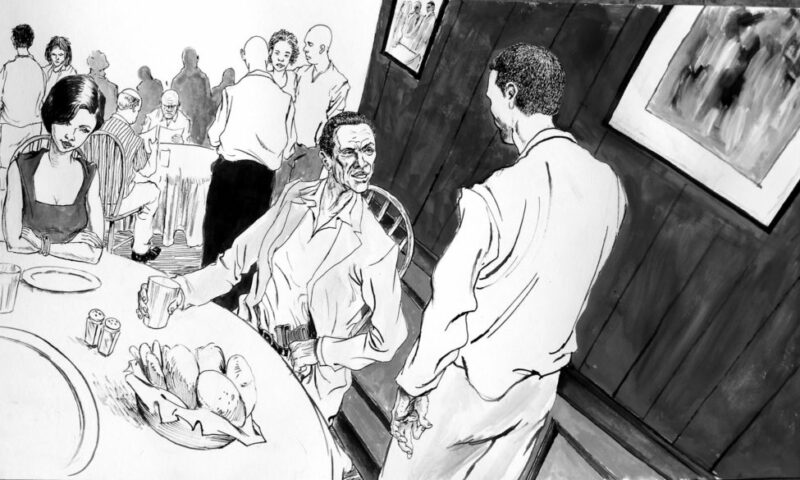

“Am I stutterin’, son?” the green-eyed pleasant-looking man with the perfect teeth said to the tall newcomer standing by his table. Around them the din of the eatery seemed to recede. “There’s no DeMarkus around here.” Like his displeasure, Teaflake made no effort to hide the butt of the Glock sticking out of his waistband.
The young woman sitting with Teaflake smiled understandingly, like she was ushering a patient in for a tooth extraction, Joseph “Little Joe” Dixon reflected.
“Didn’t mean nothing,” he said. “Heard you two was boys is all.” He wasn’t about to back down but wasn’t looking to escalate matters either.
“Who are you?” Teaflake said, his voice low, his enunciation clear and concise, a sharp contrast to the way the usual street hoodlum swallowed vowels and ignored tenses.
Little Joe said, “I’m the new fitness director at Water Stones.” The multi-purpose center was Waterston but everybody called it by its mangled nickname.
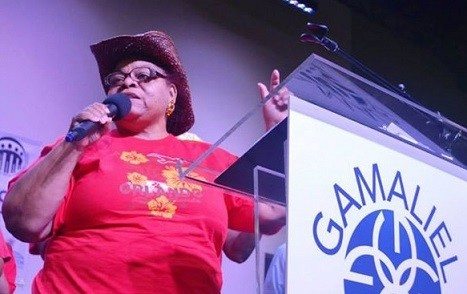

I’m currently taking an Occidental College class called Community Organizing – a required class for my Urban and Environmental Policy major. We’ve spent the last couple of weeks learning about what it means to bring about change – the planning that needs to go into it, the necessary time commitment, the different levels of power you need to take into account.
To be completely honest, I’m still figuring out whether I consider myself an activist. Am I someone who is engaged in bringing about change? I’m not sure.
That’s when I had the opportunity to interview a modern-day community organizer and change-maker: Pastor Norma Jean Patterson.
She made it clear that life-changing community organizing continues today, and made the historic leaders we talked about in class much more tangible in my mind. In the hour she spoke, she did more than just tell me her story, she moved me to understand the simpler concept underneath all the issues of community organizing: the power of loving people.
» Read more about: Community Organizing: Making it Real, from L.A. to East St. Louis »
Dino Degrassi and Jason Campbell engage in dialogues for a living. They also put the electrical wiring into some of Los Angeles’ largest and most recognizable building projects. Every morning at 6:30 the two electricians ride the street level elevator down into the construction site at Wilshire and Figueroa, where the core of the Wilshire Grand hotel is emerging out of the ground. When finished, the 73-story building will be the tallest west of the Mississippi.
Degrassi is a seasoned journeyman – ostensibly a teacher of apprentices like Campbell who work their way through a five-year program, learning as they go.
Throughout the day, the men’s hard-earned craft knowledge guides their conversation. “I try to help Jason work efficiently,” Degrassi says, as he moves along a cement deck tying in conduit. “I want to make sure he paces himself and doesn’t get hurt.”
“There’s a lot of wisdom to be learned from Dino,
» Read more about: Let’s Talk – Socrates at the Wilshire Grand »

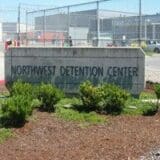
Detainees at the Northwest Detention Center, an immigrant detention center operated by GEO Group in Tacoma, Washington, initiated the first of repeated hunger strikes on March 7, 2014. A note from one of the hunger strikers passed to his lawyer read, “Please contact the local news. There’s 1,200 people not eating—better food, better treatment, better pay, lower commissary, fairness.”
The story of the hunger strikers is documented in a new report released by Grassroots Leadership and Justice Strategies detailing how immigrants detained in privately run detention centers across the country are routinely exposed to shocking levels of violence, sexual abuse, neglect, filth and wrongful death.
The report titled For-Profit Family Detention: Meet the Private Prison Corporations Making Millions By Locking Up Refugee Families, exposes how Corrections Corporation of America and GEO Group are both banking on a massive expansion to immigrant family detention.
» Read more about: Lowering the Bars for Humane Prison Conditions »
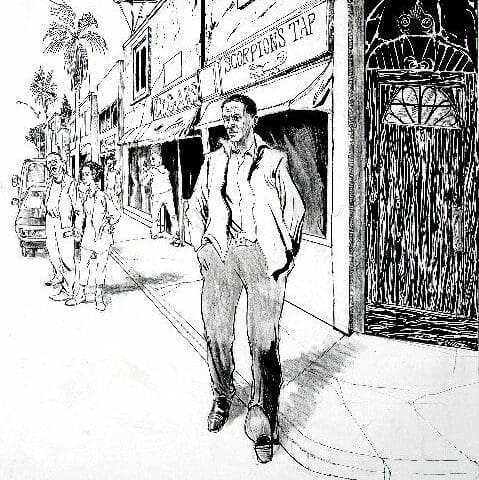

“You don’t know what the hell you sayin’,” the red-eyed man blurted. He came off his barstool too fast, knocking it over as he did so. Drunk, he teetered over to Hank Dixon, who’d turned on his stool toward him but remained sitting.
“Best slow your roll, Al,” the one-handed bartender Pierre Gaston said languidly. He took hold of an empty glass between the pincers of his prosthesis. Behind him and above the bottles on a flat screen TV, played a near mute newscast about a truckers’ job action at the port.
“Oh, I’m’a slow somethin’,” Al Griffiths sneered, ignoring the advice. He stood close to the stockier Dixon; Griffiths’ beer and vodka chasers a heavy aroma in the other man’s nose. “You didn’t go around with Juanita. She wouldn’t have had anything to do with you, toilet seat fixer.”
Dixon squinted at his accuser as he sipped on his beer.
» Read more about: The Dixon Family Chronicles: “The Sink Man” »
» Read more about: Watch: Gary Phillips Discusses “The Dixon Family Chronicles” »
By now British films that combine gritty economic issues with musical set pieces have become their own genre. These movies, often based on historical fact, typically involve the seemingly crazy schemes of a plucky band of commoners to save a dying industry or rescue a besieged group of workers. Pride is the most recent descendent of Brassed Off, The Full Monty, Kinky Boots and Made in Dagenham. It’s the story of the fateful 1984-85 coal miners’ strike, during which Prime Minister Margaret Thatcher managed to cripple the National Union of Mineworkers.
Stephen Beresford’s screenplay follows the efforts of Mark Ashton (Ben Schnetzer), a young gay militant, to rally his LGBT comrades to collect funds for the increasingly harried miners. He finds only a few adherents, but this energized band, which includes a closeted young student named Joe (George MacKay), a sarcastic lesbian, Steph (Faye Marsay) and a flamboyant actor played by Dominic West,